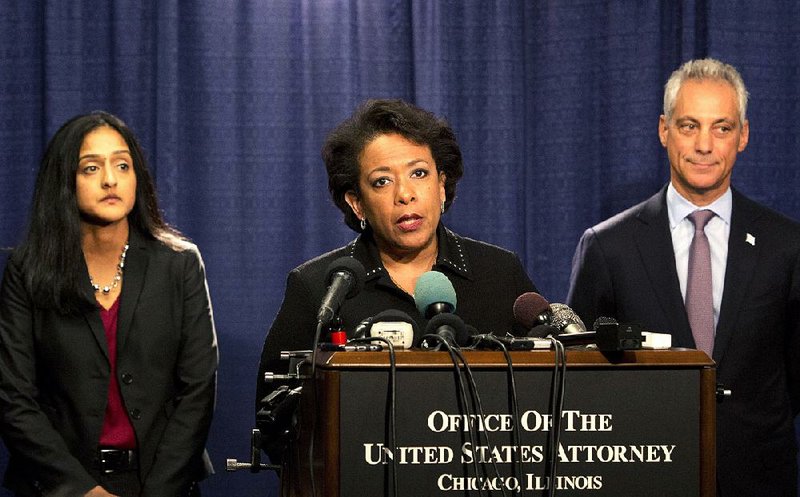CHICAGO -- The Justice Department on Friday exposed years of civil-rights violations by Chicago police, criticizing the nation's third-largest department for using excessive force on numerous occasions.
The report was issued after a yearlong investigation sparked by the 2014 death of a black teenager who was shot 16 times by a white officer. The federal investigation looked broadly at law enforcement practices, concluding that officers were not sufficiently trained or supported and that many of those who were accused of misconduct were rarely investigated or disciplined.
The findings come just a week before a change in administration that could reorder priorities at the Justice Department. Under President Barack Obama, the government has conducted 25 civil-rights investigations of police departments, including those in Cleveland, Baltimore and Seattle.
Asked about the investigation's future, outgoing Attorney General Loretta Lynch said talks between Chicago and the government would go on regardless "of who is at the top of the Justice Department."
Chicago officers endangered civilians, caused avoidable injuries and deaths and eroded community trust that is "the cornerstone of public safety," said Vanita Gupta, head of the Justice Department's Civil Rights Division.
The federal government's recommendations follow an especially bloody year on Chicago streets. The city logged 762 homicides in 2016, the highest tally in 20 years and more than the combined total of the two largest U.S. cities -- New York and Los Angeles.
The Justice Department began the Chicago investigation in December 2015 after the release of dashboard camera video showing the fatal shooting of 17-year-old Laquan McDonald, who was walking away from police holding a small folded knife. The video of the shooting, which the city fought to keep secret, inspired large protests and cost the city's police commissioner his job.
Investigators described one class for officers on the use of force that showed a video made 35 years ago -- before key U.S. Supreme Court rulings that affected police practices nationwide. When instructors spoke further on the topic, several recruits did not appear to be paying attention and at least one was sleeping, the report said.
Justice Department agents who questioned Chicago officers found that only one out of six who were in training or who just completed the police academy "came close to properly articulating the legal standard for use of force," the report said.
Mayor Rahm Emanuel said the results of the investigation were "sobering" and pledged to make changes beyond those already adopted. Federal authorities and city officials have signed an agreement that offers a broad outline for reform, including commitments to improved transparency, training and accountability for bad officers.
The report alluded to racial bias but did not center on it. A Department of Justice statement issued with the report said investigators "identified serious concerns about the prevalence of racially discriminatory conduct by some CPD officers and the degree to which that conduct is tolerated."
Black Lives Matter activists said they do not trust Emanuel to make real changes.
"I don't believe him any more than I believed him when he said that he never saw the Laquan McDonald video before the public saw it," said Arewa Karen Winters, who said she was the great aunt of 16-year-old Pierre Loury, who was fatally shot by police last year.
Kofi Ademola said he was heartened by many of the government's conclusions. But with the Trump administration taking over, "we have no idea how this is going to play out."
Chicago has spent more than a half-billion dollars to settle claims of police misconduct since 2004. But in half of those cases, police did not conduct disciplinary investigations, according to the federal report. Of 409 police shootings that happened over a five-year period, police found only two were unjustified.
The Justice Department criticized the city for failing to investigate anonymous complaints or those submitted without a supporting affidavit and for having a "pervasive cover-up culture."
Investigators said witnesses and accused officers were frequently never interviewed, that evidence went uncollected and that witnesses were routinely coached by union lawyers -- "a dynamic neither we nor our law enforcement experts had seen to nearly such an extent in other agencies."
"The procedures surrounding investigations allow for ample opportunity for collusion among officers and are devoid of any rules prohibiting such coordination," the report said.
Investigations into misconduct are "glacially slow," with discipline often "unpredictable and ineffective," said Gupta, who described how police used stun guns on people for no other reason than they did not obey officers' verbal commands.
She also said officers do not get enough support to help them deal with the trauma of their jobs.
The head of Chicago's police union said the Justice Department hurried the investigation to release its findings before Trump takes office.
In a statement sent minutes before the report was posted online, Fraternal Order of Police President Dean Angelo questioned whether the investigation was compromised because of its timing.
Information for this article was contributed by Carla K. Johnson and Eric Tucker of The Associated press.
A Section on 01/14/2017
